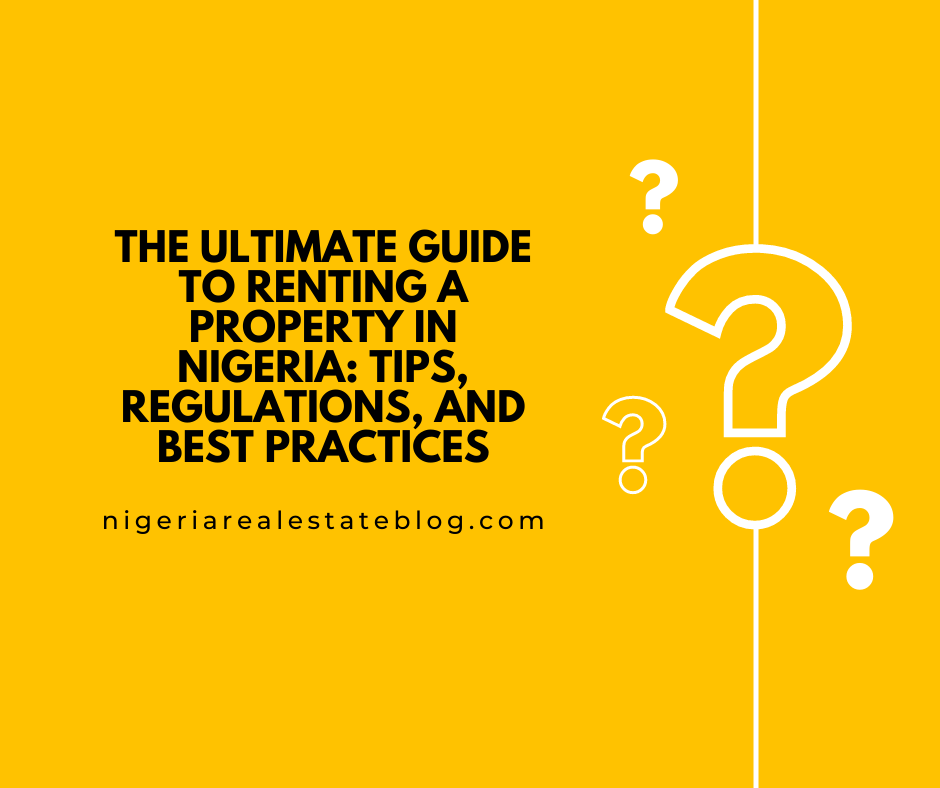
The Ultimate Guide to Renting a Property in Nigeria: Tips, Regulations, and Best Practices
Renting a property in Nigeria can be an exciting and sometimes challenging experience. Whether you’re a student, a young professional, or a family searching for a new home, understanding the rental market and navigating the process is essential. In this comprehensive guide, we will provide you with valuable tips, important regulations, and best practices to ensure a smooth and successful renting experience in Nigeria.
1. Know Your Rental Options and Types of Properties: Before diving into the rental process, it’s crucial to familiarize yourself with the various rental options available in Nigeria. From apartments to houses, and duplexes to serviced apartments, each type has its unique advantages and considerations. We’ll discuss the different options and help you make an informed decision based on your preferences and budget.
2. Understanding Rental Regulations: Navigating the legal aspects of renting is essential to protect your rights as a tenant. We’ll explore important regulations, such as tenancy agreements, rent control laws (if applicable), and the rights and responsibilities of both tenants and landlords. Understanding these regulations will empower you to make informed decisions and ensure a fair and transparent rental process.
3. Factors to Consider Before Renting: Finding the perfect rental property goes beyond location and price. We’ll guide you through essential factors to consider, including amenities, security, proximity to schools and markets, transportation options, and the overall neighborhood. By evaluating these factors, you can select a property that suits your lifestyle and needs.
4.The Rental Process Step-by-Step: We’ll provide you with a detailed step-by-step guide to renting a property in Nigeria. From searching for properties and contacting landlords or agents to property inspections, negotiations, and the documentation required, we’ll cover every aspect of the rental process. For a list of available rental properties, you can check out Krent. Following this guide will help you stay organized and confident throughout your search.
5. Rental Rights and Responsibilities: As a tenant, it’s important to know your rights and responsibilities. We’ll outline key aspects such as privacy, maintenance responsibilities, security deposit regulations, and dispute resolution mechanisms. By understanding these rights, you can protect yourself and ensure a harmonious tenant-landlord relationship.
6. Budgeting for Renting: Managing your finances effectively is crucial when renting a property. We’ll provide practical tips on budgeting for rental expenses, including monthly rent, utility bills, agency fees, and security deposits. By having a clear understanding of the financial aspects, you can plan your budget wisely and avoid any financial stress during your tenancy.
7. Moving-in and Settling Down: Once you’ve found the perfect rental property, we’ll offer valuable tips for a smooth transition. From setting up utilities and conducting a thorough inventory check to getting acquainted with the neighborhood, our suggestions will help you settle down comfortably in your new home.
8. Effective Tenant-Landlord Communication: Maintaining open and effective communication with your landlord or property manager is key to a positive renting experience. We’ll provide tips on how to address maintenance issues, rent payments, and other concerns professionally and promptly. Effective communication fosters a healthy tenant-landlord relationship and ensures a hassle-free tenancy.
Conclusion: Renting a property in Nigeria can be a rewarding experience when armed with the right knowledge and information. By following this ultimate guide, you’ll be well-prepared to navigate the rental market, understand the regulations, and make informed decisions. Remember, renting a property is more than just finding a place to live—it’s about finding a home where you can


